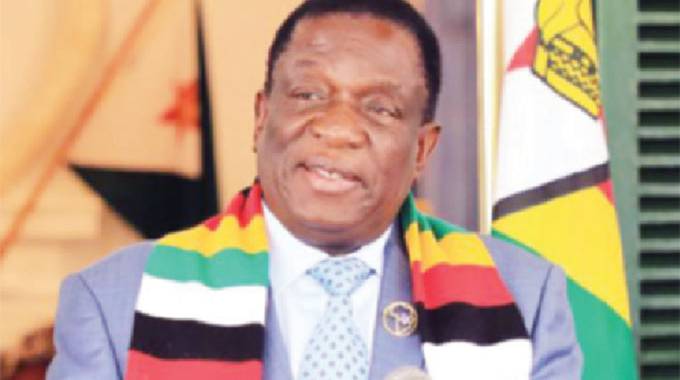Devolution & Decentralisation Policy document launched

Hebert Zharare Business Editor
The comprehensive “Devolution and Decentralisation Policy” is now out, fleshing out the constitutional requirements and spelling out strategies for the successful implementation of the national agenda to promote development across the country’s 10 provinces.
The policy document details the implementation framework, local government structures, devolved functions, citizen participation, devolution and Vision 2030. It also covers financing resources, role clarity and devolved service delivery, staffing for the devolved mandates, and financial and administrative capacity among other key deliverables.
In his foreword, President Mnangagwa said devolution was adopted as a key component of the new 2013 Constitution. Devolution ensures the preservation of national unity in Zimbabwe, prevention of all forms of disunity and secessionism and the democratic participation in Government by Zimbabweans. So there must be devolution of power and responsibilities to lower tiers of Government.
“The policy on devolution and decentralisation is one of the major anchors of our unity, which encompasses inclusive development. A major objective of the policy is to promote in Zimbabwe ‘sustainable’, representative, accountable, participatory, inclusive governance and socio-economic development.
“Although the Constitution provides broad parameters on the Zimbabwe Devolution Agenda, a policy is needed to guide the process of removing ambiguities, gaps, inadequacies and impractical provisions, which might be inherent in the Constitution, particularly with regard to the modus operandi of provincial and metropolitan councils,” said the President.
He reiterated some of the guidelines issued regarding the formulation of a sound national Devolution and Decentralisation Policy, whose objectives include the empowerment of local governance to the people and enhancing their participation in the exercise of the powers of the State and in making decisions on issues affecting them.
Some of the guidelines, the President said, include promoting democratic, effective, transparent, accountable and coherent Government in Zimbabwe, preserving and fostering peace, national unity and the indivisibility of Zimbabwe as a sovereign State, providing recognition of the right of communities to manage their own affairs and furthering their own development and encouraging and ensuring the equitable sharing of local and national resources.
The other guidelines include transferring local fiscal responsibilities and resources from the national government to sub-national entities in order to establish a sound financial base for each provincial and metropolitan council and the local authorities in rural areas.
Ministers of State for Provincial Affairs are expected to champion development programmes in their provinces. The discharge of that mandate will be closely monitored by the Office of the President and Cabinet. Through their leadership, the Government administrative machinery, consisting of different decongested central-government ministerial officials, should operate in an efficient and coherent manner.
“Finally, approval of this policy document by Cabinet has triggered a series of legislative amendments and new laws aimed at resolving conflicting constitutional or legislative amendments and new laws aimed at resolving conflicting constitutional or legislative provisions with regard to practical aspects of rolling out a Devolution and Decentralisation Policy.
“To that end, appropriate amendments to both the Constitution and other Acts of Parliament will be
undertaken with a view of aligning the spirit of the Constitution and other legislated laws to practical realities demanded by the new policy, whose main thrust is to uphold existing constitutional standards in the exercise of local governance powers.
“Importantly, may I reiterate that the Devolution and Decentralisation Policy on the devolution of power to the provinces and local authorities, remains one of the pillars which will sustain the unitary architecture of the Zimbabwean State. This is a progressive measure, which will enable our unitary state to respond better and faster to the demands for efficient service delivery, development, democracy, national integration and peace,” said President Mnangagwa.
On urban councils and rural district councils, the policy notes that the country already has some devolution exercised through these local authorities established to provide services to a heterogeneous citizenry in geographically-defined and demarcated areas of their jurisdiction.
On the implementation network and as articulated in Vision 2030, decision-making and authority in the provision of most basic services, will be delegated and decentralised to provincial and district levels.
“The policy seeks to bring Government closer to communities and make it more accessible as a way of enhancing responsiveness, accountability and participatory governance over local development agendas.
“Decentralisation will be founded on regional investment and development plans derived from a broad national investment and development master plan. This will entail strengthening Government’s planning capacity through Treasury or a National Economic Planning Commission,” reads the document in part.
The pace at which devolution processes will be implemented, according to the policy, draws impetus from the advent of the Second Republic in November 2017.
This marked the beginning of a serious commitment by Government towards the implementation of the devolution policy in line with the 2013 Constitution.
The implementation of the devolution agenda will be broad-based and inclusive of civil society and the citizenry whose bottom-up participation assisted with the design of envisaged processes.
The document details some of the roles and functions of all provincial and metropolitan councils that include:
Planning and implementing social and economic development activities;
Coordinating and implementing Government programmes;
Planning and implementing measures for the conservation, improvement and management of natural resources;
Promoting tourism and developing facilities for that purpose; and
Monitoring and evaluating the use of resources.
According to the document, citizens will indirectly elect members who will serve on provincial and metropolitan councils through a system of proportional representation, while urban and rural district councils will be directly elected. Provincial councils operate in the eight provinces that have a range of urban and rural district councils. Metropolitan councils operate in a similar way in Harare and Bulawayo provinces where the components are all urban councils.
Furthermore, the Constitution in its current form includes elected members of Parliament and Senate, including those appointed to ministerial positions, in the provincial and metropolitan councils, making them eligible to participate in both provincial and national governance institutions.
“Local democracy can only be protected by citizens who are capable of effectively articulating their demands to elected officials. They should also be capable of acting or demanding appropriate information which enables them to perform a watchdog role over elected and employed officials.
“Hence, the devolution policy provides for separate capacity building initiatives targeted at local citizens, in order to empower them to hold local officials accountable over the implementation of approved regional development plans,” reads the document.
Government acknowledged that as the implementation of the country’s devolution agenda takes root, provincial and metropolitan councils and local authorities will not have sufficient financial capacities to provide services devolved by Government to them.
Critical services, which require funding, with short to long-term repayment tenure, include water provision, sanitation, health and education.
As such, Treasury disbursements to metropolitan and provincial councils and local authorities, will complement their own mobilised resources to fund service delivery across communities.
“Central Government official transfers including grants for supplementary funding of devolved functions, would be through local authorities’ budgets. Argumentation for financial allocations from the national budget is defined in Section 301 of the Constitution. In this regard, local authorities will have scope to develop their own revenue streams, including leveraging of local natural resource endowments which would target funding of specific purposes.
“Initially, Treasury will target distributing 5 percent of fiscal revenues to subnational tiers of Government towards funding local authorities budgets. Devolved Government structures are expected, under the Constitution, to directly submit their estimates of expenditures as approved by their councils to Treasury,” reads the 56-page document in part.










Comments